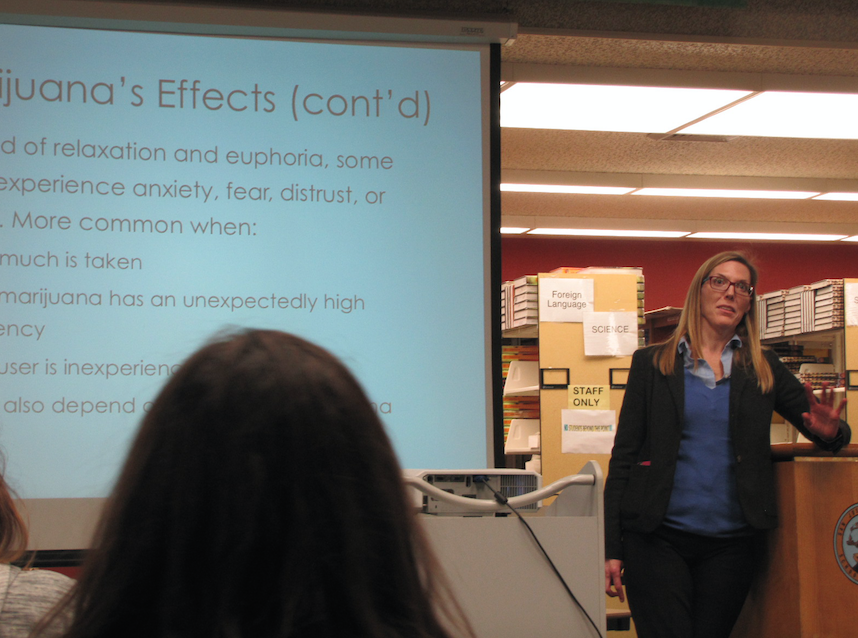Drugs, Alcohol, and Sexual Awareness Speech
On Monday, November 9th, Allison Bateman Ph.D, from the Santa Clara Wellness Center, came to the Media Center at Lincoln to speak about Drug, Alcohol, and Sexual Assault Awareness. She spoke about some of the personal experiences she had as a counselor at Santa Clara and Humboldt University, while showing statistics on the topics.
Dr. Bateman started off by showing the audience a survey funded by the National Institute on Drug Abuse and the National Institute of Health. This survey of about 50,000 students, ranging from 8th grade to college, portrayed mostly good news however, also had some areas of concern.
Good News
- decreasing alcohol, cigarette, and prescription pain reliever use
- stable rates of marijuana among teens (progress)
- General decline in the use of illicit drugs
Areas of Concern
- Causes brain damage
- high use of vaping
The first topic she discussed was drugs. In California, marijuana use is the highest compared to all other states where medical marijuana is not readily available. All other drug use is not as common as marijuana, and the main reason behind that is because students believe there could not be any possible harm from a drug that is prescribed to millions of people. Dr. Bateman made sure to stress the fact that this belief is extremely untrue, and all drugs are equally as bad, even though they do not possess the same effects. The main ingredient in marijuana is called TCH (tetrahydrocannabinol) which causes the high effect, and it has progressively increased over the past two decades. In the sixties only about 2-3% of TCH was present in marijuana while today it is 20-33%, “sixties pot is nothing like today’s pot,” she said. Just like the nicotine present in cigarettes, and the equally as harmful e-cigs, TCH is definitely addictive.
The main effects marijuana might cause include: increase in appetite, change in pleasure zones, problems with being able to plan, motor control issues(especially while driving, it will slow down your react time), it will impair the cognitive functions(short and long term memory),and in some people it will cause anxiety, emotion, and fear. Some people believe it heightens your learning ability, which is not true. It only works if you are, for example, studying for a test in a specific state of high to feel “concentrated”, and you come in to the test in that same specific state of high. Otherwise the student will not remember anything. In fact Dr. Bateman told the audience that an adolescent/ young adult that smokes weed will loose 8 IQ points every single time, and they never recuperate them; adults who do it loose nothing.
Other studies showed that most of the students receive their “weed” from a friend or a relative, and there are various ways of taking it. The most popular way of taking it is by smoking it, the effects last from 1 to 3 hours. People start to experience brighter colors, laughter, and hunger; they take it more often due to positive advertising. Another way is through ingestion, these are called edibles. Because edibles have delayed effects of about 30 minutes to an hour people will feel the need to ingest more. These effects will last for hours and hours. Dr. Bateman shared a story of a friend whose kid brought a chocolate bar edible home, and thinking it was a real chocolate bar, she ate it all, then ended up in the ER. A final form of taking marijuana is through lotions, vaporizes, dabbing(budder, waxes, shatter, etc). TCH may remain in the body for several weeks after use. Some of the long term effects include an increased risk of schizophrenia and bronchitis. Once people try to stop doing it they often find it very hard because it causes makes normal life seem mundane and boring compared to the short euphoria they experience.
The other topic discussed was on alcohol. Alcohol is a common issue, however over the past two decades binge drinking has definitely declined, but not completely disappeared. Binge drinking is not every day drinking, but when they do drink it happens to be 4-5 or more drinks in one sitting for about 2 hours or more. BAC(Blood Alcohol Concentration) levels often rise up to at least .08, which is the legal limit to driving under the influence. She explained that in college students prefer hard liquor rather than beer. The reasons behind that is because it is easier to smuggle, it contains less calories, and it is easier to get drunk through 5 shots as opposed to 5 beers. They simply want an easier way to feeling intoxicated. Dr. Bateman talked about the students she meets with, telling her that they will be “a little more careful this time,” yet do the same the next time around. She says they try to take multiple approaches on how to reduce harm and risk and overall drinking, but they cannot control what everybody does, however they sure can help.
A dangerous issue with alcohol is mixing it with marijuana, it can increase the risk of alcohol poisoning. For example, if your BAC is .04 and your TCH level is at 5% then your adjusted BAC level will be .09. If you were to be extremely high at a 70% TCH level then the adjusted BAC level is .33, which is the amount needed to kill you. People often decide to smoke and drink at the same time because the effects of marijuana prevent them from throwing up. The issue with that is that throwing up is only only way the body tries to get rid of the harmful alcohol inside the body, and preventing it from doing so leads to alcohol poisoning.
The last issue discussed was sexual assault. Studies showed that one in five women are raped, and men are one in seventy-one. It usually occurs when a person is intoxicated, and men are usually the perpetrators. Men become aggressive and hostile while women get sexual and start petting. However, because most people have no memory while intoxicated they don’t remember whether they had the other person’s consent or not. Either way everyone is responsible for their own actions.
For the men in the audience that did not like the idea of men being “targeted” as the perpetrators, it is just most likely for a man to take the initiative while drunk. However, yes, women have been charger with sexual assault, but sometimes they are not reported. They usually are not reported because men feel ashamed or embarrassed on whether they should report it, and they are scared of what other people might think. Ten percent of all rapes are filed, and six percent of them are false, therefore for the last percentage that is true, there must be a tedious process to finding the truth. Some factors they use as evidence is finding out who was more intoxicated at the time of the incident, and who initiated it at the time.
Overall, Dr. Bateman organized a very informative presentation regarding drugs, alcohol, and sexual assault.

Jacqueline Moncada is a senior at Lincoln High School, she was born in San Jose, CA, although she is part Mexican and Lebanese. She enjoys playing all...









